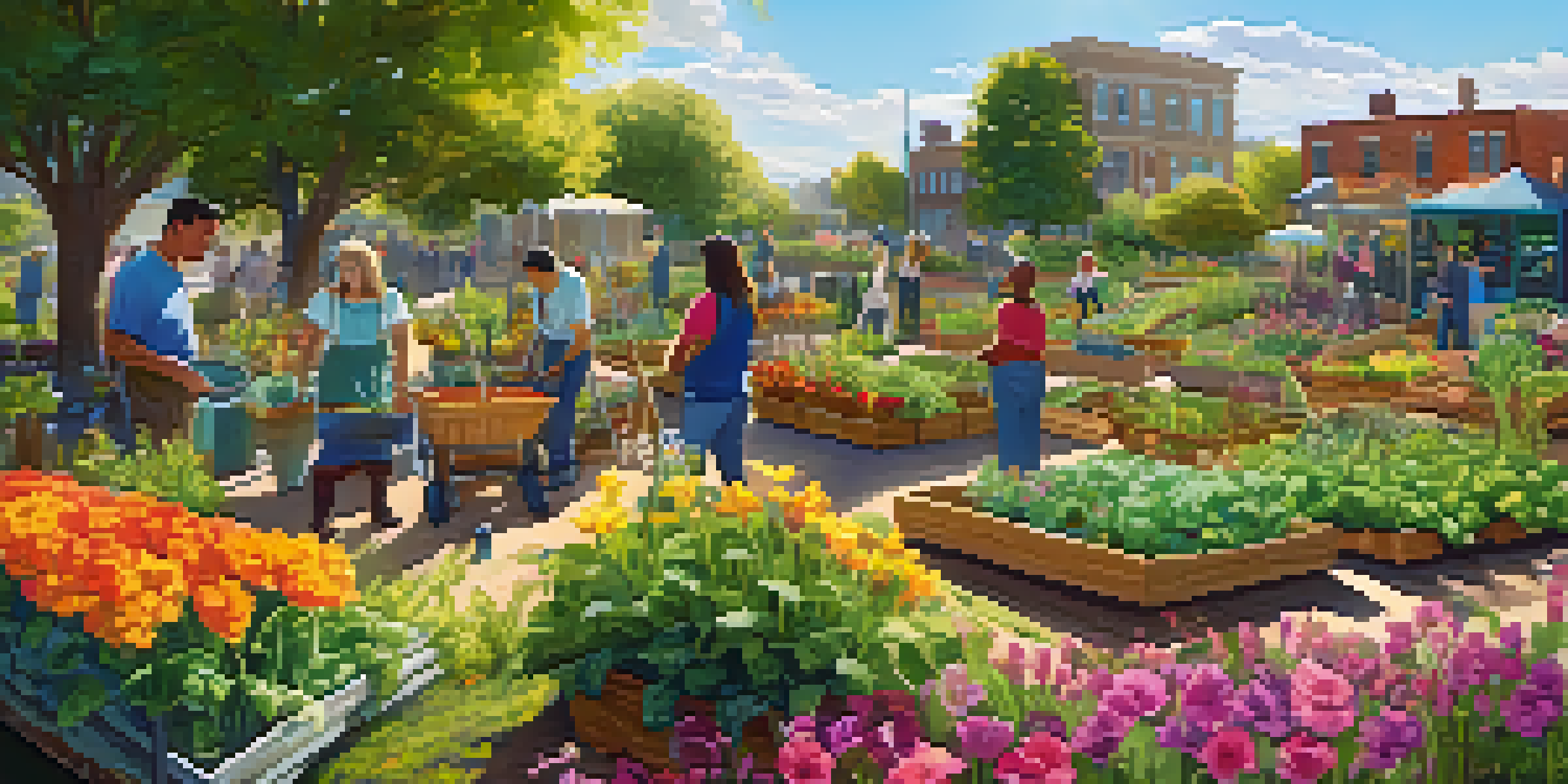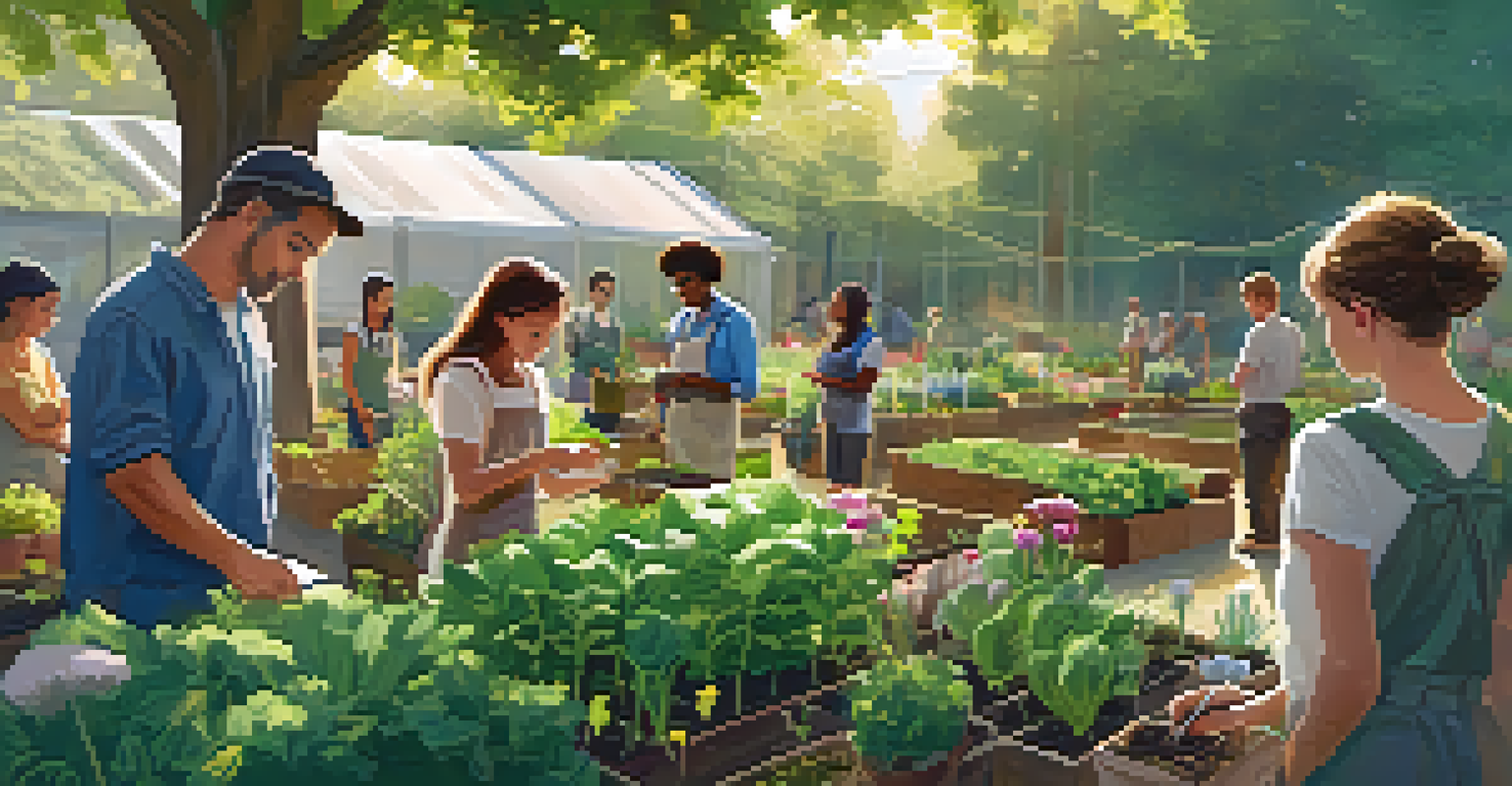Promoting Outdoor Activities through Community Gardening Programs

The Benefits of Outdoor Activities in Community Gardening
Engaging in outdoor activities through community gardening offers a variety of physical and mental health benefits. Not only does it encourage regular exercise, but it also allows individuals to soak up the sun, which can improve mood and boost vitamin D levels. The act of planting, weeding, and harvesting can be a refreshing break from the usual indoor routine.
To plant a garden is to believe in tomorrow.
Moreover, gardening fosters a sense of accomplishment. Watching plants grow from seeds to a flourishing garden is not just rewarding; it instills a sense of pride in participants. This shared goal of nurturing life can create strong bonds among community members, enhancing social interactions.
Additionally, community gardening often attracts individuals of varying ages and backgrounds, promoting inclusivity. This diverse participation can lead to the exchange of gardening tips, cultural practices, and even recipes, enriching the community's collective knowledge and experiences.
Creating a Sense of Community Through Gardening
Community gardening serves as a platform for building relationships among neighbors. When people come together to plant and maintain a garden, they naturally start conversing, sharing stories, and forming friendships. This interaction can transform a neighborhood from a collection of houses into a thriving community.

Organizing garden events, such as planting days or harvest festivals, further strengthens these connections. These gatherings provide opportunities for socializing, learning about gardening techniques, and even enjoying fresh produce together. Such events help foster a sense of belonging and community spirit.
Health Benefits of Gardening
Community gardening encourages physical activity and improves mental well-being through social interactions and exposure to sunlight.
Moreover, community gardens often become a hub for local initiatives. As neighbors collaborate on gardening projects, they may also discuss other community issues, leading to collective problem-solving and improvements. This collaborative atmosphere encourages residents to take pride in their community.
Encouraging Sustainability Through Gardening
Community gardening promotes sustainable practices, teaching participants about organic gardening techniques and the importance of biodiversity. When members learn to grow their own food, they become more aware of the environmental impact of their choices. This knowledge can motivate them to adopt eco-friendly habits both in and out of the garden.
The best time to plant a tree was twenty years ago. The second best time is now.
By prioritizing sustainability, community gardens can also influence local food systems. As gardening members share their harvests, they often encourage others to seek out fresh, locally grown produce. This shift can lead to reduced reliance on industrial farming and an increased appreciation for seasonal eating.
Furthermore, many community gardens incorporate composting and water conservation methods, showcasing practical ways to minimize waste. Participants not only learn valuable skills but also witness the direct benefits of sustainable living, encouraging them to continue these practices in their daily lives.
Educational Opportunities in Community Gardening
Community gardens can serve as excellent educational platforms for all ages. Schools and local organizations often partner with gardens to create programs that teach children about plant biology, nutrition, and environmental stewardship. These hands-on experiences can ignite a lifelong passion for gardening and sustainability.
For adults, workshops and classes on topics like organic gardening, pest management, or cooking with fresh produce can be incredibly beneficial. These sessions not only impart knowledge but also allow participants to connect with experts and each other. This shared learning experience often leads to increased confidence in gardening skills.
Building Community Connections
Gardening fosters relationships among neighbors, transforming neighborhoods into vibrant communities through shared experiences.
Additionally, community gardens can host events that focus on cultural education, where participants share traditional gardening practices and recipes from their backgrounds. This exchange of knowledge enriches the community and fosters a greater appreciation for diversity.
Promoting Physical Activity through Gardening
Gardening is a fantastic way to sneak in physical activity without the need for a gym membership. Tasks like digging, planting, and weeding can provide a full-body workout, improving strength and flexibility. For many, this is a more enjoyable way to exercise than traditional workouts.
Moreover, spending time outdoors while gardening can increase overall physical fitness. The combination of fresh air, sunlight, and movement can be invigorating, making it easier to stick to a routine. This natural approach to fitness often feels more rewarding than monotonous gym sessions.
Community gardening also encourages group activities, such as planting days or maintenance sessions, which can motivate participants to stay active together. The camaraderie built during these sessions often leads to a more consistent commitment to both gardening and physical health.
Challenges and Solutions in Community Gardening
While community gardening offers numerous benefits, it’s not without its challenges. Issues such as limited space, securing funding, and maintaining participant engagement can arise. However, these obstacles can often be overcome with creativity and collaboration.
For instance, utilizing vacant lots or partnering with local schools can expand gardening spaces. Fundraising events or grants from local organizations can help secure necessary resources. Building a strong network of passionate participants can also ensure the longevity and success of the gardening program.
Sustainability and Education
Community gardens promote sustainable practices and serve as educational platforms, teaching participants about eco-friendly gardening techniques.
Additionally, establishing a clear structure for communication and responsibilities within the garden can enhance engagement. Regular meetings and shared responsibilities can keep everyone involved and invested in the garden's success, making it a cherished community asset.
The Future of Community Gardening Programs
As urban areas continue to grow, the importance of community gardening is more pronounced than ever. These gardens not only beautify neighborhoods but also promote food security and environmental health. The ongoing trend of returning to local food sources makes community gardens a vital part of sustainable living.
Looking ahead, technology can play a pivotal role in the future of community gardening. Apps and platforms that connect gardeners, share resources, or provide gardening tips can enhance community connections and collaboration. This integration of technology can help streamline gardening efforts and attract younger generations.

Furthermore, as more people recognize the value of green spaces, we can expect to see an increase in community gardening initiatives. These programs have the potential to create lasting impacts on community health, environmental awareness, and social cohesion for years to come.